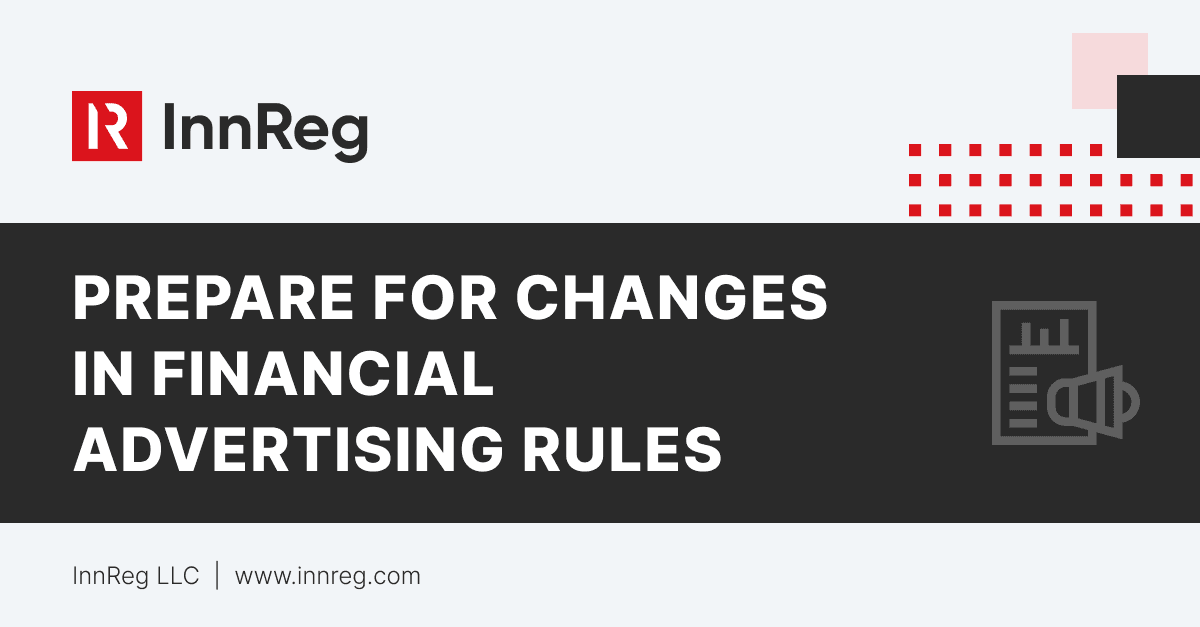Contents
Financial advertising has been changing so rapidly that regulatory bodies have taken a long time to catch up with today’s world of digital, social media, and influencers. Their guidelines have begun evolving. Here’s what financial innovators need to know about the latest FTC and SEC regulations, as well as key insights on the impact of compliance programs on digital marketing.
See also:

InnReg is a global regulatory compliance and operations consulting team serving financial services companies since 2013. If you need assistance with compliance or fintech regulations, click here.
Keeping Digital Ads and Influencer Marketing Laws on Track
Folding marketing and communications compliance into an overall compliance program poses special challenges for financial innovators. In fact, the current state of regulations does not offer much assistance in addressing these challenges. Guidance for areas such as digital, pay-per-click, social media ads, and influencers has been ambiguous so far... but that has begun to change.
FTC Compliance for Influencer Marketing
On November 5, 2019, the FTC guidelines for influencers has been updated on when and how influencers must disclose sponsorships to their followers. These rules apply to all businesses, including fintechs and other financial innovators.
What’s in Scope
To define the scope of the term clearly, influencers are individuals who are able to affect purchase decisions of others because of their authority, knowledge, position or relationship with their audience. They typically wield that influence on social media.
Influencer Marketing Disclosure Compliance
Per the FTC, influencers must now make it obvious when they have a relationship (“material connection”) with the brand. A “material connection” to the brand includes a personal, family, or employment relationship or a financial relationship – such as the payments for endorsements or receiving free or discounted products or services.
Influencers also must not misrepresent their experience with a product or make unsubstantiated claims about the product.
Influencer Marketing Laws for Advisors
For the world of investment advice, the FTC guidelines are about to become very relevant. It is true that influencer marketing is currently prohibited by the SEC Advertising Rule (see below) in very explicit terms because it falls into the territory of testimonials and endorsements. However, proposed SEC rule amendments are in the works, so firms should be prepared to update their compliance programs if they plan to use influencers in their marketing toolkit. Any influencer communications would need to be reviewed per FTC guidelines as well as proposed changes to the Advertising Rule.
SEC Advertising Rule: Changes Ahead?
The SEC Advertising (Rule 206(4)-1) and Solicitation (Rule 206(4)-3) Rules were defined in the Investment Advisers Act of 1940. They establish firm guidelines, but at the same time, these rules have not been substantially updated in nearly 60 years! Given the age of the rules, they refer only to print, radio, and television advertising, and they remain silent on new forms of media and advertising.
Playing it Safe with Digital Marketing
The safest bet for most companies has been simply to assume that the rules apply to any other form of advertising as well. However, the rules were designed for a mass-media world and do not neatly apply to our highly-targeted and social digital era. As currently written, these regulations create unworkable constraints in today's digital world.
For example, the advertising guidelines include a direct or indirect reference to any testimonial or endorsement of any kind as "a fraudulent, deceptive, or manipulative act, practice, or course of business." That’s where they collide with the concept of influencer marketing; they create significant challenges of interpretation when it comes to social media likes and comments.
Consider the case of an Illinois-registered investment adviser that posted a video about its 50th anniversary on its website and YouTube. The video included customers talking about the firm, ultimately resulting in a $15,000 fine by the SEC.
Current SEC Advertising Rule
The SEC has recognized this gap. On November 4, 2019, it released two proposed rule amendments that will help modernize the regulation of advertising.
A Broader Definition. The definition of advertising under the amendments would be broadened to include "any communication, disseminated by any means, by or on behalf of an investment adviser, that offers or promotes investment advisory services or that seeks to obtain or retain advisory clients or investors in any pooled investment vehicle advised by the adviser." Digital platforms, social media, and future means will now be unambiguously covered by the terms of the Rule.
Relaxing Endorsement Rules. The prohibition of anything that could be constituted as a testimonial or endorsement would be substantially lessened. These forms of advertising would be permitted as long as the adviser discloses whether the person giving the testimonial or endorsement is a client and whether compensation has been provided by or on behalf of the adviser. Rather than a blanket limitation, this proposed amendment lays out a set of general principles ([See callout box below]) for prohibited advertising practices that could intentionally mislead or misrepresent.
Why a “Principle-Based Approach” Creates Risk
These changes are generally anticipated by the industry. However, a principles-based approach does raise the prospect of questions for how a negligent violation of those principles is determined. The principles are qualitative and subjective.
The proposed amendments are currently open for public comment prior to any revision before final adoption. From a compliance perspective, firms must not make any changes to current compliance processes for marketing and advertising.
Review Marketing Compliance Now, Adapt Later
When it comes to marketing and advertising, a relaxation of regulation is likely welcome news. However, these changes in no way remove the onus of rigorous compliance reviews of communications. They would simply change the rules of the game.
Before any amendments are finally adopted, it is a good time to take inventory of marketing compliance review processes now, and make sure they are both robust and adaptable.
If you have questions about marketing compliance, please be in touch.
How Can InnReg Help?
InnReg is a global regulatory compliance and operations consulting team serving financial services companies since 2013.
We are especially effective at launching and scaling fintechs with innovative compliance strategies and delivering cost-effective managed services, assisted by proprietary regtech solutions.
If you need help with compliance, reach out to our regulatory experts today:
Published on Dec 30, 2019
Last updated on Aug 29, 2023
Related Articles

All Fintech
Feb 12, 2025
·
11 min read

All Fintech
Dec 26, 2024
·
18 min read

All Fintech
Dec 11, 2024
·
8 min read
Latest LinkedIn Posts












